To an outsider looking in, all might seem well at Stoke City.
Comfortably in mid table, with high profile individuals such as Jack Butland, Xherdan Shaqiri, and Bojan on the books, they have a billionaire owner and a manager offering stability in his fourth season at the club.
But, beneath the surface, you will find a fan base becoming increasingly restless in the face of apparent stagnation both on and off the pitch.
It is important for a club such as Stoke to realise its limitations. The Leicester miracle aside, medium-sized clubs can hope to finish no higher than seventh, given the gulf between them and the likes of Chelsea, Spurs, Liverpool, Arsenal and the two Manchester teams. Everton too are looking resurgent under Ronald Koeman. Stoke have finished ninth in three consecutive seasons since Mark Hughes replaced Tony Pulis.
As such, you might ask yourself what more the Potters can hope or ask for. The Stoke fanbase is largely very grounded. There have been too many setbacks in recent history for any delusions of grandeur. They know their place: they are a small fish punching above their weight in a big pond. But Hughes has become a victim of his own success.
Having replaced Pulis in 2013, he transformed the fortunes of a side which had become bogged down playing turgid, defensive football. He brought in a more attractive style, more skilful players, more goals and, crucially, higher league finishes. Importantly, he had a clear plan—a vision of where he wanted to take the club. He put round pegs in round holes and signed players who fitted the system, all on a very modest net spend.
Arguably his biggest failing is that this plan seems to have been thrown out of the window. For 18 months, he has displayed cluttered thinking, making a catalogue of perplexing decisions. Whenever results have floundered, he has lost faith in the players who he himself signed, and reverted to the “old guard”—Tony Pulis’ committed but uninspiring journeyman, the likes of Peter Crouch, Jon Walters, and Charlie Adam.
On the field, performances have regressed. A poor start to the season left Stoke on two points after six games. Within that run, drubbings by Spurs and Crystal Palace exposed a brittle team low on confidence. Only the rather fortuitous loan signing of Derby County’s third choice goalkeeper Lee Grant and an inspired point away at Manchester United in early October stopped the rot.
Seven months on and things feel rather flat again. Stoke are safe, sitting in twelfth place at the time of writing. But that is to mask what has been a dour season.
Whatever happens, they will finish the season with their lowest points total since Mark Hughes joined the club. They have not beaten a side above eleventh in the league all season. They have not scored a goal in an away game for four months. Team selections and substitutions continue to infuriate. Performances in the cups were dire: beaten at home by second string Hull and Wolves sides in the early rounds of both domestic competitions. Stevenage are the only side disposed of by Stoke in knock-out football this season.
Off the field, the management have alienated large sections of the support thanks to bizarre transfer dealings. The club’s record signing, Gianelli Imbula, is rarely included in the matchday squad. Saido Berahino—the man brought in to end the club’s goalscoring woes—has failed to score since his arrival in January. The exciting £5m Egyptian Ramadan Sobhi is routinely overlooked. Talented players such as Bojan and Joselu have been sent out on loan. Xherdan Shaqiri has been a walking sick-note. At the same time, new contracts have been handed to Peter Crouch and Glen Johnson, who, whilst good players in their time, are now deadwood who epitomise Stoke’s slow, numbing football.
Put simply, the excitement has gone. Matchdays feel like a chore, exactly as they became in the dying embers of Tony Pulis’ reign. Any level-headed fan knows that trophies and European football are mere pipe dreams. But what is needed is some entertainment, some finesse. Hughes, to his credit, provided this in spades in his first two-and-a-half seasons at Stoke, but for 18 months now, the decline has been stark.
So what next for Stoke? They approach a crossroads this summer, with some key decisions to make. Peter Coates, the chairman, must decide whether to stick or twist with Mark Hughes. If he sticks, many fear that Stoke’s regression will worsen. That said, his staunchest supporters argue that he has earned more time at the helm. If he twists, a new manager could reinvigorate the club, but no managerial change comes without risk.
As far as this Stokie is concerned, Coates— who has made his fortune through Bet365— should gamble again and replace Hughes.



